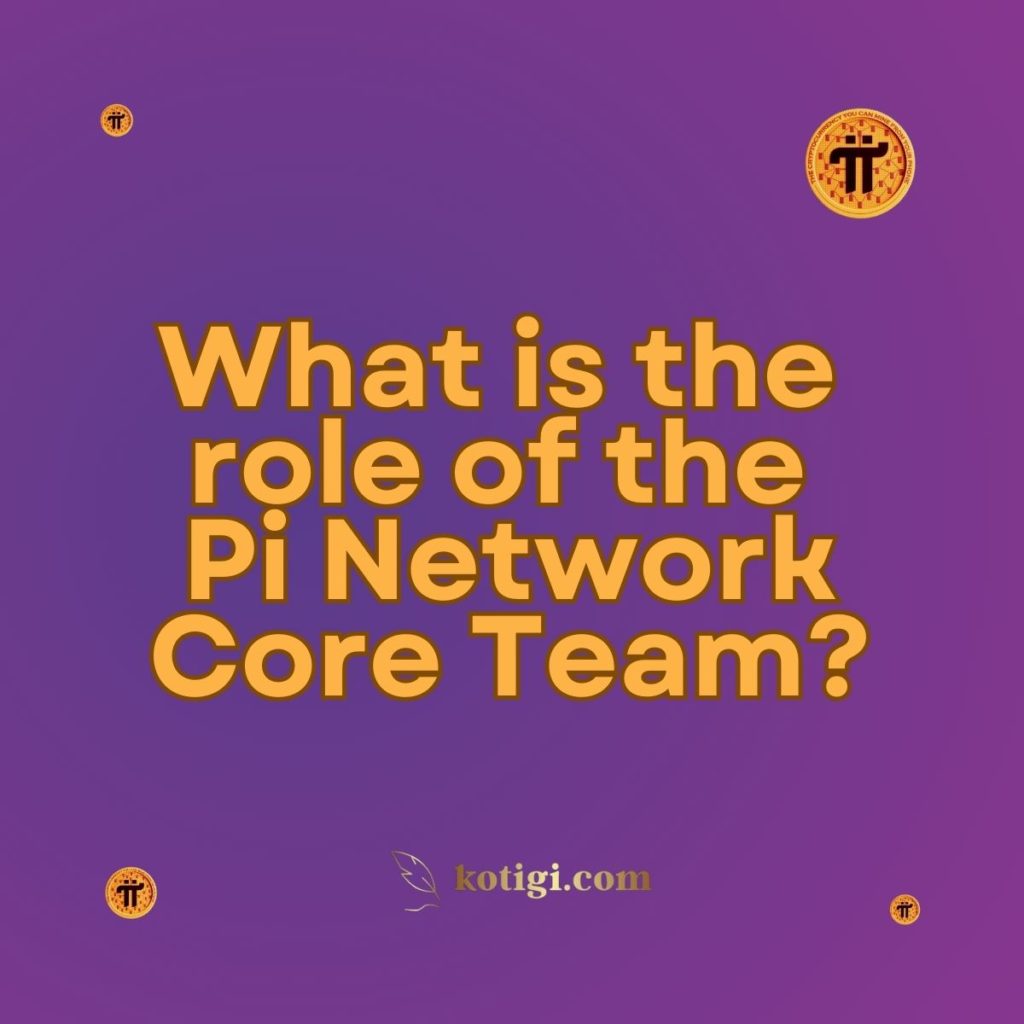
What is the role of the Pi Network Core Team?
The Pi Network Core Team is responsible for developing and guiding the overall vision of Pi Network, ensuring the platform’s technical foundation, security, and governance. They oversee blockchain development, manage community engagement, and work towards the sustainable growth of the Pi ecosystem. The Core Team’s focus on transparency, innovation, and inclusivity drives the project forward while ensuring that Pioneers have a strong, secure, and evolving network to participate in.
Introduction
The success of any blockchain project largely depends on the people behind it, and Pi Network is no exception. The Pi Network Core Team is the backbone of the platform, providing both the vision and technical expertise needed to guide the network’s growth. As Pi Network continues to attract millions of users worldwide, the role of the Core Team becomes increasingly vital in ensuring that the network remains secure, innovative, and sustainable.
This blog post will explore the specific roles of the Pi Network Core Team, delving into their responsibilities in blockchain development, community engagement, and long-term governance, as well as the importance of their leadership in building trust within the growing Pi ecosystem.
1. Leadership and Vision of the Pi Core Team
Setting the Strategic Direction
The Pi Network Core Team, led by Pi’s co-founders, plays a crucial role in shaping the long-term vision and strategic direction of the project. From the onset, the team aimed to create a blockchain network that prioritizes inclusivity and accessibility, allowing people from all backgrounds to participate in cryptocurrency without the technical and financial barriers found in traditional mining systems. This vision continues to drive their decisions as they guide Pi Network toward its Mainnet launch and future evolution.
Building a Sustainable Ecosystem
One of the Core Team’s primary responsibilities is to ensure that Pi Network develops into a sustainable ecosystem. This involves planning for the growth of the user base, creating opportunities for developers to build decentralized applications (dApps) on the platform, and fostering economic opportunities within the Pi ecosystem. By strategically managing resources and ensuring that the blockchain can scale effectively, the Core Team helps maintain Pi Network’s long-term viability.
Innovating in Blockchain Technology
Innovation is at the heart of the Core Team’s role. By developing and implementing new technologies that make blockchain more accessible and efficient, they ensure Pi Network remains competitive and forward-looking. The Core Team constantly works on improving the platform’s technical architecture and ensuring that it can support large-scale decentralized applications in the future.
2. Development of the Pi Blockchain
Overseeing Technical Infrastructure
The Core Team is responsible for developing and maintaining Pi Network’s technical infrastructure. This includes building and optimizing the blockchain itself, managing the underlying consensus algorithm, and ensuring that the system remains secure, scalable, and efficient. The team works on software updates, improving the mobile mining app, and ensuring that users can continue to participate in the network smoothly.
Ensuring Security and Stability
A top priority for the Pi Core Team is the security and stability of the network. Blockchain projects, especially those with millions of users, face significant security risks. The Core Team continuously monitors and enhances the security features of the platform, ensuring that the network is resilient to attacks and protecting the assets of its users. This includes improving wallet security, safeguarding user data, and ensuring the integrity of the mining process.
Consensus Algorithm Management
The Pi Core Team also oversees the development and implementation of Pi Network’s consensus algorithm, which allows the network to operate efficiently while maintaining decentralization. The team has chosen the Stellar Consensus Protocol (SCP), which enables secure and scalable transaction processing without relying on traditional energy-intensive mining. The Core Team’s role is to ensure that the algorithm continues to function optimally as the network grows.
3. Community Engagement and Support
Fostering Community Participation
The Pi Core Team places a strong emphasis on community engagement, recognizing that the success of the network depends on the active participation of its users, known as Pioneers. The Core Team works closely with the community to provide updates, organize events like Pi Day celebrations, and create forums where users can share ideas and ask questions. This engagement fosters a sense of belonging and investment among Pioneers, helping to maintain a vibrant and active user base.
Transparent Communication
The Pi Network Core Team is dedicated to maintaining transparency with its community. They provide regular updates on the development process, clarify the roadmap for the platform, and address user concerns through official channels. Communication tools like the Fireside Forum, social media platforms, and Pi’s official blog keep the community informed about the progress of the project and upcoming milestones. This level of transparency is crucial for building trust within the network.
Handling User Feedback
The Core Team also plays a pivotal role in listening to user feedback and integrating it into the platform’s ongoing development. Pioneers are encouraged to share their ideas and concerns, and the Core Team actively seeks feedback on new features and improvements. This collaborative approach ensures that Pi Network evolves in a way that aligns with the needs and expectations of its users.
4. Governance and Decision-Making
Building Decentralized Governance
One of the Core Team’s long-term goals is to establish a decentralized governance system that allows the Pi community to have a direct say in the future of the network. While the Core Team currently makes most major decisions regarding the platform’s development, they are working toward a model where users can participate in governance through voting on proposals. This transition to decentralized governance is essential to maintaining the ethos of blockchain technology.
Shaping the Economic Model
The Core Team is also responsible for designing and refining the economic model that will drive Pi’s ecosystem. As Pi moves toward the Mainnet, the team is working on creating a balanced and fair distribution of Pi tokens, ensuring that early adopters are rewarded while maintaining an economy that encourages new users to join. The Core Team’s focus on creating a sustainable economic model will be key to the success of Pi’s future marketplace.
Ensuring Legal and Regulatory Compliance
Given the rapidly changing regulatory landscape surrounding cryptocurrencies, the Pi Core Team is committed to ensuring that Pi Network operates within legal boundaries. This includes adhering to international regulations related to data privacy, anti-money laundering (AML), and Know Your Customer (KYC) requirements. By maintaining compliance, the Core Team protects Pi Network’s future and ensures it can operate smoothly in various jurisdictions.
5. Educating and Supporting Developers
Developer Platform and Tools
The Core Team recognizes that a successful blockchain network requires a strong developer ecosystem. To this end, they have created a platform where developers can build decentralized applications (dApps) within the Pi ecosystem. The Core Team provides resources, tools, and support to help developers create innovative solutions that enhance the Pi Network experience.
Encouraging Innovation
Through initiatives like hackathons and developer grants, the Pi Core Team encourages developers to innovate on the platform. These programs incentivize developers to create valuable applications that expand the use cases for Pi, from e-commerce solutions to decentralized finance (DeFi) applications. By fostering innovation, the Core Team helps to ensure that the Pi ecosystem remains dynamic and attractive to both developers and users.
Collaboration with the Pi Developer Community
The Pi Core Team maintains a close relationship with the developer community, regularly soliciting feedback and providing guidance on best practices. This collaborative environment not only ensures the quality of dApps being developed but also helps align the work of developers with the overall goals of the Pi Network.
Conclusion
The Pi Network Core Team plays a multifaceted role in driving the growth and success of the Pi ecosystem. Their responsibilities range from developing the blockchain’s technical infrastructure and ensuring security, to fostering community engagement and designing governance structures for the future. By prioritizing transparency, user participation, and innovation, the Core Team has positioned Pi Network as a unique and accessible cryptocurrency project with the potential for long-term success.
As Pi Network moves closer to its Mainnet launch, the continued leadership of the Core Team will be essential in navigating challenges and capitalizing on opportunities, ensuring that the network remains secure, inclusive, and sustainable.
Key Takeaways
- The Pi Network Core Team is responsible for developing and managing the platform’s technical infrastructure and long-term vision.
- They ensure the security and scalability of the network through continuous improvements to the blockchain and its consensus algorithm.
- The Core Team fosters strong community engagement by maintaining transparent communication channels and actively soliciting feedback.
- A key part of the Core Team’s role is designing a decentralized governance model that will empower the Pi community to make important decisions.
- The Core Team supports developers by providing tools and resources for building dApps, encouraging innovation within the Pi ecosystem.





